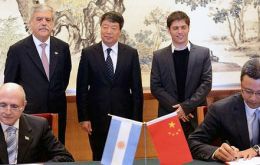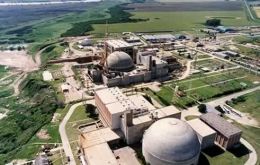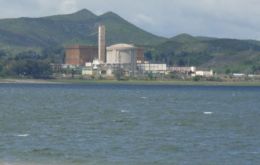MercoPress. South Atlantic News Agency
Tag: Atucha
-
Saturday, May 6th 2017 - 12:17 UTC
Argentina and China will sign contract to construct two nuclear powered plants

Argentina and China will sign next 17 May in Beijing a contract for the construction of two new nuclear powered plants, with an investment of US$ 12.5 billion, according to Argentina's Nuclear energy deputy secretary, Julian Gadano.
-
Friday, April 24th 2015 - 07:51 UTC
Russia and Argentina agree on an “all-encompassing strategic partnership”

Russia and Argentina signed agreements which amounted to an “all-encompassing strategic partnership” during Argentine President Cristina Fernandez visit to Moscow, which ended on Thursday with the meeting at the Kremlin with her counterpart Vladimir Putin.
-
Thursday, September 4th 2014 - 05:20 UTC
Argentina's dispute with holdouts “will not affect” Chinese investments, says Beijing

The current legal dispute between Argentina and holdouts (“vulture funds”) suing the country over its defaulted bonds “will not affect” planned Chinese investments, since Argentina and China have a 'strategic association', the head of the National Commission of Development and Reform (CNDR) of China Xu Shaoshi, warned on Wednesday.
-
Monday, July 14th 2014 - 05:24 UTC
Russia offers to build (and finance) two new nuclear power plants in Argentina

Russian President Vladimir Putin signed on Saturday a nuclear energy cooperation deal with Argentina on the third stop (Cuba, Nicaragua) of a tour to bolster trade ties and strengthen Russia’s influence in Latin America.
-
Tuesday, February 11th 2014 - 07:53 UTC
Paraguay concerned with Argentine plans to move nuclear facilities to border area

Paraguay has instructed its ambassador in Buenos Aires to collect information on Argentina's plans to set up an uranium processing plant in the northern province of Formosa, neighboring with the land-locked country.
-
Friday, May 10th 2013 - 06:17 UTC
Brazil and Argentina agree to jointly build two nuclear research reactors

Atomic power agencies from Brazil and Argentina signed an agreement to build two nuclear reactors for research and production of radioisotopes, according to the Ministry of Science and Technology (MCT).
-
Thursday, September 29th 2011 - 16:03 UTC
Argentina leader in use of nuclear power for peaceful purposes, says CFK

President Cristina Fernández de Kirchner (CFK) opened on Wednesday the country’s third nuclear plant Atucha II, in the Greater Buenos Aires district of Zárate, and highlighted the fact that “Argentina is leader in the use of nuclear power for peaceful purposes.”
-
Thursday, August 25th 2011 - 06:08 UTC
Canada to overhaul and expand Argentine nuclear power plant

Argentina signed contracts worth 444 million dollars on Wednesday with a subsidiary of SNC-Lavalin Group, Canada's top engineering firm, to extend the shelf-life of its Embalse nuclear plant.
-
Friday, April 29th 2011 - 21:42 UTC
Argentina will press ahead with plans to develop small-scale nuclear reactors

Argentina will press ahead with plans to develop a small-scale nuclear reactor over the next three years, even when last month‘s disaster in Japan prompted countries such as Germany and Brazil to reconsider projects.
